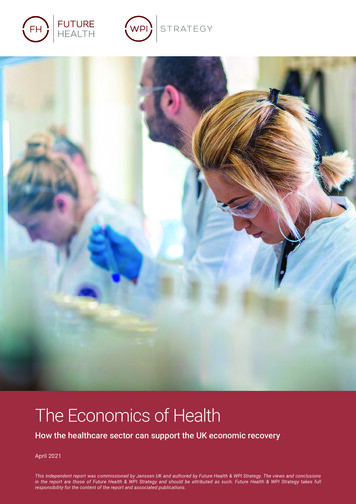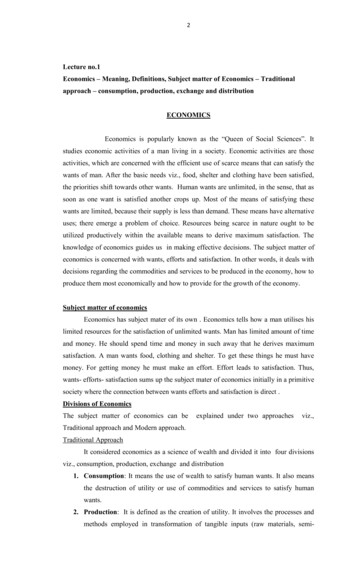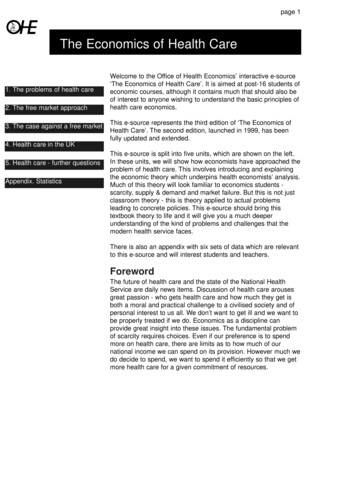
Transcription
The Economics of HealthHow the healthcare sector can support the UK economic recoveryApril 2021This independent report was commissioned by Janssen UK and authored by Future Health & WPI Strategy. The views and conclusionsin the report are those of Future Health & WPI Strategy and should be attributed as such. Future Health & WPI Strategy takes fullresponsibility for the content of the report and associated publications.
futurehealth-research.comThe Economics of Health: How the healthcare sector can support the UK economic recoveryForewordForeword02Executive summary03Recommendations04Chapter 1: Introduction: The link between health and wealth05Chapter 2: The ‘Economics of Health’06Chapter 3: Economic Analysis of the Economics of Health in the UK16Chapter 4: Building a policy framework that supports the UK healthcaresector as an engine of economic growth21Chapter 5: Conclusion30Annex A: Sources and methodology31Endnotes33Disclaimer & LegalThis report has been produced by Future Health. The views expressed in the report are based on independent research and representsolely the views of the authors. They are provided for informative purposes only.Whilst we undertake every effort to ensure that the information within this document is accurate and up to date, Future Health do notaccept any liability for direct, implied, statutory, and/or consequential loss arising from the use of this document or its contents
futurehealth-research.comThe Economics of Health: How the healthcare sector can support the UK economic recoveryAbout the authorsRichard SloggettRichard Sloggett is the Founder and Programme Director of Future Health. He was Special Advisor to the Secretary of State for Healthand Social Care from 2018-19 and previously led Policy Exchange’s health and social care work. Richard is a regular commentator in thenational media on health and social care including in The Times, Telegraph, Financial Times, Economist and on Times Radio, BBC andLBC. He has been named as one of the top 100 people in UK healthcare policy by the Health Service Journal.During his time with the Secretary of State, Richard worked across Whitehall, the NHS and local government on major policy decisionsincluding the NHS Long Term Plan, the creation of NHSX and the Prevention Green Paper. He also supported Ministers on globalhealthcare issues including preparations for the G7 and action on antimicrobial resistance. He has fifteen years’ experience in publicpolicy and healthcare, starting his career in Parliament before a successful career in public affairs where he led a team of 20 to theprestigious Communique Public Affairs Team of the Year Award.Richard is undertaking his doctoral thesis in preventative healthcare systems at Liverpool University. He has a Masters Degree withDistinction from the University of Nottingham and a Bachelors Degree from the University of Durham.Steve HughesSteve Hughes is an economist and author. He was previously the head of economic and social policy at the think tank PolicyExchange, and published reports on increasing savings rates and reducing youth unemployment. Before Policy Exchange he workedat the Bank of England, where he helped manage the regulatory system that governs cash distribution in the UK. He has previouslyworked as an economist at the British Chambers of Commerce where he advised on tax, international trade and SME finance policy,and in parliament, where he researched HM Treasury legislation as it passed through the House of Commons.About Future Health About WPI StrategyFuture Health is a future focused Research Centre with a missionWPI Strategy is a specialist policy and communications agencyto advance public policy thinking that improves the health andled by Dr Sean Worth, a former Downing Street special adviser onwealth of people, communities and nations. Healthcare systemshealth policy and Nick Faith, a leading communications expertaround the world are facing significant challenges of demographic,who founded the centre-right think tank, Onward.societal and technological change.Our team is made up senior former government advisers fromThe importance of prevention and the development of newNo10, HMT and other Whitehall departments, plus policy andtechnologies have long been seen as ways to transform healthmedia experts. We work currently for some of the UK’s leadingsystems to improve patient outcomes and performance, butcommercial brands, including Vodafone, British Land and Tesco,progress has often been slow.and have delivered major projects for many top health brands,COVID-19 is an inflection point, demonstrating the need andincluding Bupa, Virgin and the NHS Confederation.opportunity of investing in and delivering more effective andAn example of our work relevant to this task force initiative is theefficient healthcare services in the future.Covid Recovery Commission, which we set up recently to feed inIn undertaking cutting edge public policy research and generatingnew insights and solutions, Future Health seeks to shape theglobal healthcare policy debate and inform the decisions madeby Governments and health systems to enable healthier, wealthierpeople, communities and nations. futurehealth-research.comideas on economic recovery to government from the UK’s mostsenior business leaders. The initiative was welcomed publicly bythe Chancellor and is engaging on policy at the most senior levelsof government. wpi-strategy.com@wpi strategy@fh research01
futurehealth-research.comThe Economics of Health: How the healthcare sector can support the UK economic recoveryForewordThe COVID-19 crisis has provided a devastating reminder that in the absence of a safe and healthy environment, weresort to surviving instead of thriving. The pandemic has inflicted an unimaginable human cost, it has also savaged oureconomy, torn apart the social fabric, and exposed and aggravated race, health and wealth inequalities.COVID-19 has demonstrated that health makes a far greater contribution to the GDP of a country than is captured in theeconomic data. It directly contributes to the creation of thousands of jobs in both the public and private sectors, attractsbillions of pounds in direct investment, and is one of the main drivers of the UK’s R&D heritage. Health also significantlycontributes indirectly to the wealth of the nation. Good health enables each individual to fully participate in society,to secure an income, and to improve wellbeing. Yet, GDP metrics do not sufficiently capture the impact that medicalinnovations have on the health or wealth of a nation.Despite the unprecedented events of the last year, the UK has taken up the challenge to reset, rebound and rebuild. Theheroic resilience of NHS staff, the world-class innovation, the scale and the speed of clinical trials, the leadership inglobal collaboration and the almighty immunisation programmes have been spectacular displays of Britain’s healthcarecapabilities, and the confirmation of a huge and mostly untapped economic potential.The UK can yet go further to unleash the full extent of its health sector, and with the right interventions, millions of livescould be improved, mounting inequalities could be reduced and GDP could be increased.Janssen commissioned this independent ‘Economics of Health’ report to identify the pockets of productivity within thehealthcare system which could be better utilised and to understand how and where the health sector could help ‘level-up’the country. This report also seeks to suggest targeted interventions that could attract innovators and manufacturersto invest in the UK as a result of a more deliberate reform agenda, a more integrated and digitalised system, and a morebusiness-friendly eco-system that exceeds peer countries.The findings of this analysis are compelling; with the research estimating that over three quarters of a million jobs in thehealthcare sector could be created by 2030. Critically for a Government committed to ‘levelling up’ these jobs will involvewide ranging skills and be spread regionally. Yet immediate and significant actions at both policy and political levels arerequired to realise the aspirations. A resurgence of the health sector has the potential to improve the standard of living,give the country a unique competitive advantage, and start a new cycle of prosperity. Achieving this vision will demandtrue partnership and collaboration between all health sector stakeholders. Janssen is committed to taking part in thisnational effort to improve both the health and wealth of the UK.Gaëtan LeblayUK Managing Director, Janssen UK02
futurehealth-research.comThe Economics of Health: How the healthcare sector can support the UK economic recoveryExecutive summaryThe Covid 19 pandemic has had a profound impact on both the health and economy of the UK. The higher proportion ofdeaths experienced in part has been fuelled by poor underlying health and health inequalities.1As we start to now look ahead, through and beyond Covid, at how to rebuild our communities and economies, there areopportunities to adopt new policies and approaches that can deliver on the Government’s desire to ‘build back better.’The ‘Economics of Health’ is one such framework the UK Government should adopt as it plots a route forward. This modelsees healthcare not solely as a cost to be borne but as a platform for investment, growth and increased prosperity acrossthe country.Before the pandemic arrived the Government had identified two high profile priorities. Making the UK after Brexit a leadinginnovation economy and science superpower; and levelling up the regions of the UK and tackling regional inequalities.The UK’s health sector presents an opportunity to deliver on both these ambitions.The Covid vaccine development and rollout is testament to the strong UK life sciences and health innovation base builtup over successive Governments. The sector has strong regional centres of research excellence, and through the NHSand partner organisations is a major regionally based employer. Alongside this, are concerns about how rising demandfor healthcare will be met, not only in acute services where shortages exist for doctors and nurses but also more widelyacross the healthcare ecosystem including for roles such as pharmacists, dentists, informatics, optometrists, publichealth, management and administration. And how, after Brexit the UK will continue to attract and build top teams ofresearch and science talent to support a thriving healthcare sector and medical and scientific research.Our research calculates that with the right support the sector could generate 775,000 new jobs by 2030, with stronggrowth in a range of places across the country including Birmingham, Manchester, Belfast, Bristol and Leicester.To do so will require a new ‘Economics of Health’ approach from Government, underpinned by three pillars: National co-ordination of ambitions for the healthcare sector including a new recruitment campaign and skills driveacross the sector along with new incentives to support inward investment and R&D Regional investment in centres of excellence that sees the healthcare sector support ambitions for ‘levelling up’ Utilising healthcare sector growth to tackle health inequalities and improve health outcomesAdopting this three part model to unlock the economic potential of the healthcare sector will deliver an attractiveproposition to global healthcare organisations and investors, catalysing inward investment, that supports jobs and thegrowth of regional economies whilst tackling underlying health inequalities.03
futurehealth-research.comThe Economics of Health: How the healthcare sector can support the UK economic recoveryRecommendationsRecommendation 1: The Government should refresh the life sciences strategy post Covid and Brexit to set out anambitious, co-ordinated future healthcare and life science sector strategy to attract inward investment, growth and jobs tothe UKRecommendation 2: The Government should explore expanding and reforming R&D tax credits to ensure that the UKremains competitive with other global markets in life sciencesRecommendation 3: The Government should increase the national proportions of R&D investment in centres of healthcareresearch excellence across the UK; seeing these centres as hubs for regional growth and playing a central role in levellingup. It should also look at incentives to attract private sector investment into the UK’s regions that supports the healthcaresectorRecommendation 4: Government should set ambitions within accountability frameworks for public services todemonstrate an active role in the delivery of economic growth in their areasRecommendation 5: The Government should run a well funded ‘Armed Forces style’ campaign to inform and encouragepeople into the full range of healthcare sector careers. The NHS should be able to hold the apprenticeship levy at aregional level to invest flexibly in apprenticeships, skills and training opportunities for healthcare sector staffRecommendation 6: The Government should utilise the new ONS Health Index to set targets for delivering on itsambitions for improving healthy life expectancyRecommendation 7: Central funds assigned for ‘levelling up’ should include a role for the healthcare sector and have anambition to improve the nation’s health and reduce regional health disparitiesRecommendation 8: Changes to Public Health England should be used to create a co-ordinated and dynamic health andwealth agenda within Government that seeks to unlock the potential of the healthcare sector to drive economic growthand reduce population health inequalities04
futurehealth-research.comCHAPTERThe Economics of Health: How the healthcare sector can support the UK economic recovery1 Introduction: The link between healthand wealthThe Covid 19 pandemic has unfortunately regularly pitched health and the economy as topics against one another.Covid restrictions to economic output undertaken by Governments have been done in the names of improving healthoutcomes. Subsequent openings up from restrictions, as infection rates have fallen, have been done with the justificationof restarting economies.However such a bifurcation is unhelpful. The pandemic has demonstrated the inextricable link between improving healthand stronger economies. In the UK widening health and economic inequalities and underlying poor health were drivers ofhigher proportional death rates from the virus.2As the UK seeks to launch economic recovery plans beyond the pandemic it is critical that the link between healthand wealth plays a central role. Investing in healthcare and the health sector can be a catalyst for improved economicprospects, regional growth and longer term improved health outcomes and prosperity.Such an approach to the healthcare sector as an economic growth engine is not new. The World Health Organisation hasregularly cited the importance of healthcare to the performance of national economies.3 Kluge and Figueras note that:“numerous studies have shown that individuals in better health enjoy improved opportunities for economic participationand earnings compared to their less healthy counterparts. Better health leads to higher rates of labour marketparticipation and later retirement.”4However despite these benefits, it can be challenging to build cases for increasing Government investment in healthcareand the healthcare sector. Finance ministries can see healthcare as a growing cost of national income with demographicand technological changes driving seemingly ever increasing costs. The wider positive benefits of investment in thehealthcare sector, including regional jobs, the scale of the wider supply chain and impacts on work and productivity areless salient, transparent and easy to quantify.It should not be not forgotten that when the NHS was established in 1948 that Secretary of State Nye Bevan believed thatthe institution would pay for itself, as improved healthcare would reduce health need.5 The reality has been very different.05
futurehealth-research.comCHAPTERThe Economics of Health: How the healthcare sector can support the UK economic recovery2 The ‘Economics of Health’Not to be confused with the practice of ‘health economics’; the ‘economics of health’ is a field that seeks to demonstratethe economic impact of healthcare systems and interventions. The World Health Organisation (WHO) provides aframework for developing this: There is strong evidence that health system spending contributes to better health outcomes; While inefficiencies exist in all health systems, health policy-makers can (and increasingly do) prove that they areserious about achieving value for money by monitoring performance and by showing commitment to policies thatexplicitly seek to minimise waste and the misuse of public resources; Health systems are an important component of the macroeconomy, both as an industry that provides a large numberof jobs, and also as a key determinant of a productive labour force; Health systems support societal well-being by enhancing social protection and reducing impoverishment associatedwith ill health, as well as through channels such as happiness and life satisfaction that remain elusive to commonmetrics; Health systems help support fiscal sustainability by keeping older people active and able to contribute to society,while also reducing their demands on pensions, welfare payments, and publicly funded health care services6When assessing the WHO’s benefits of the economic contribution of the healthcare sector in the UK context, four majorareas of importance emerge as set out in Figure 1.Figure 1 Economics of Health – UKUK Government spending on healthcareThe link between the UK’s health and economic outcomesThe role of healthcare in regional economiesHealthcare and future economic developmentIt can be argued that success in these areas are good indicators of a nation’s prosperity.06
futurehealth-research.comThe Economics of Health: How the healthcare sector can support the UK economic recoveryUK Government spending on healthcareHealthcare continues to attract and require greater Government expenditure based on demographic, technological andsocietal changes. However the levels of new investment made have varied significantly over time.A study in the United States published in 2020 by Ragupathi and Ragupathi concluded: “a positive correlation betweenhealthcare expenditure and the economic indicators of income, GDP, and labor productivity.” The study stated that: “anincrease in healthcare expenditure has a positive relationship with economic performance.”7 This correlation reflectedsimilar studies from the fields of international development by Bloom et al8 and Bein et al.9In the UK ONS figures from 2018 on healthcare expenditure (the latest figures) show how healthcare spending has beenon a consistent, upwards trend. As a proportion of GDP total current healthcare expenditure in the UK accounted for 10%of GDP in 2018, compared with 9.8% in 2017 and 6.9% in 1997.10An Institute for Fiscal Studies (IFS) report assessing the last 70 years of healthcare spending found an average real termsgrowth of 3.6% between 1949 50 and 2018 19. Adding that “since 2009 10 it has grown at the much slower rate of 1.3%per annum. This followed a period of unusually sharp increases at 6.0% pa between 1996 97 and 2009 10, such that theaverage growth between 1996 97 and 2018 19 was 4.1% per annum (above the long-run average).”11The majority of this spending is Government (and specifically NHS financed care) with Government-financed healthcareexpenditure contributing 166.7 billion accounting for 78% of total healthcare spending.12 The below chart from theHealth Foundation demonstrates the significant rises in healthcare spending in the early 2000s before a flatter trajectorypost 2010.13Figure 2: Health Foundation analysis of UK public spending on health07
futurehealth-research.comThe Economics of Health: How the healthcare sector can support the UK economic recoveryThe IFS notes that “health is now the largest single item of government expenditure and accounts for a steadily increasingshare of all public spending. Public spending on health increased from 7.7% of total public spending in the mid-1950s(and 10.4% of public service spending) to 13.4% in 1999 00 (20.2% of public service spending), to 17.9% in 2018 19(25.9% of public service spending).”14The Institute argues that spending has only just kept up with demand:“Department of Health and Social Care spending has only just met demographic pressures since 2009 10. Afteraccounting for the growth and ageing of the population, DHSC spending was broadly flat between 2009 10 and 2016 17,before rising over the three years to 2018 19. Therefore while recent funding increases have been sufficient to meetdemographic pressures, they are unlikely to have been sufficient to also meet all other pressures (such as changes inpopulation health, new medical technology and treatments, and wage pressures).”15This is borne out in figures regarding healthy life expectancy, progress on which has stalled in the last decade.Table 1: ONS data on Healthy Life ExpectancyHealth Life Expectancy UK (yrs)Selected 82016-201863.163.62000-02 to 2016-2018 change2.41.22009-11 to 2016-2018 change0.4-0.2In March 2021 the ONS published the latest life expectancy data for the UK. This showed that England, Wales andScotland had ‘among the lowest annual improvements in life expectancy at birth for both males and females.'16Out of the G7, UK healthcare spending per person is the second lowest, with France, Germany and the US taking the topthree spots respectively.17 The ONS graph below compares UK healthcare spending with other countries and shows theUK is just above the median for OECD countries.08
futurehealth-research.comThe Economics of Health: How the healthcare sector can support the UK economic recoveryFigure 3: OECD healthcare spending by country 2019 (dollars per 0008,00010,00012,000Source: mSummaryWith UK healthcare spending only just meeting demand and with clear links between a strong healthcare sector andan improved economy, there is an opportunity for the Government to adopt a new approach. This would see the UKaccelerating investment in the sector as part of future post Covid financial and economic plans. The G7 this yearpresents an opportunity for the UK to put the health sector as a central part of the global economic recovery effort.09
futurehealth-research.comThe Economics of Health: How the healthcare sector can support the UK economic recoveryThe link between the UK’s health and economic outcomesImproved health outcomes can strengthen human capital and consequently improve productivity – therefore contributingto overall economic performance.18According to the ONS the UK suffers a substantial productivity gap on other G7 countries. As set out in the graph below,this has been calculated at 16.3% on a GDP per hour worked basis.19Chart15 1: UK productivity vs G7 countries based on ONS data GermanyThe reasons for the UK’s productivity challenges are multi-faceted. Reasons identified have included relatively lowlevels of public investment, poor quality management and a lack of quality vocational education.20 A report by northernacademics in November 2018 found that poor health contributed to over 25% of the productivity gap between the northand the south.21It has been estimated that the cost of ill health amongst working age people in the UK is 100 billion, with sicknessabsence costing employers 9bn a year.22 Almost 1 in 3 working-age people in the UK have a long-term health conditionwhich puts their participation in work at risk. Around 1 in 5 of the working-age population has a mental health condition.23The pandemic has badly affected areas and populations in more deprived communities. A Public Health England analysisfrom August 2020 found: “people who live in deprived areas have higher diagnosis rates and death rates than those livingin less deprived areas. The mortality rates from COVID-19 in the most deprived areas were more than double the leastdeprived areas, for both males and females. This is greater than the inequality seen in mortality rates in previous years,indicating greater inequality in death rates from COVID-19.”24Similarly there is evidence that the economic impacts of the pandemic have more greatly affected lower earners. A studyearly in the pandemic by the Resolution Foundation found that: “30% of the lowest earning fifth of employees having beenfurloughed or lost jobs, compared to 8% of the highest earning fifth.”25 Meanwhile the IFS has noted the long term costsan economic downturn can have on people’s health:“An economic downturn has a number of effects on people’s lives through increased unemployment, decreasedemployment, reductions in income and wealth, and increased uncertainty about future jobs and income. The healtheffects caused by these adverse macroeconomic conditions will be complex, and will differ across generations, regionsand socio-economic groups. Groups that are vulnerable to poor health are likely to be hit hardest even if the crisishit all individuals equally, but evidence is already emerging that the economic repercussions of the crisis are fallingdisproportionately on young workers, low-income families and women so this will also need to be taken into account.”2610
futurehealth-research.comThe Economics of Health: How the healthcare sector can support the UK economic recoverySummaryImproved health can support a stronger and more productive economy. Before the pandemic the UK was performingpoorly when compared to other G7 countries on its levels of productivity, a proportion of which is fuelled by poorerhealth.The Covid pandemic has had a more profound impact in areas of deprivation and poorer population health. As partof the economic recovery efforts and in trying ‘to build back better’ there is an opportunity for the Government tomore closely align the health and wealth agendas to support a stronger and more resilient recovery.The role of healthcare in regional and local economiesThe recent Public Health England profile for the UK’s health found the country in the lower-middle ranking of EU countriesfor life expectancy: “compared with other EU countries, the UK has shifted down the male life expectancy rankings,moving from 6th highest out of 28 countries in 2006, to 10th highest in 2017. Life expectancy for women has rankedconsistently lower, 17th in both years.”27These data are underpinned and driven by substantial variations in outcomes across the country. Indeed the UK Secretaryof State for Health and Social Care Matt Hancock in launching his priorities for his new term in office in December 2019noted: “it can’t be right that as we enter the 2020s a man born in Buckingham can expect 68 years of good health, but aman born in Blackpool can only expect 53. That’s a health-span gap of 15 years.”28The Northern Health Science Alliance (NHSA) has calculated that reducing the number of working age people withlimiting long-term health conditions by 10% would decrease rates of economic inactivity by 3% in the NorthernPowerhouse. Analysis from the NHSA has found a regional productivity gap between the north and the rest of England of 4 per-person per-hour. Closing this productivity gap by 30% (or 1.20 per-person per-hour), would create an additional 13.2 billion in UK Gross Value Added (GVA).29With regards to employment, the Alliance states that increasing the proportion of people in good health in the north by3.5% would reduce the employment gap between the Northern Powerhouse and the rest of England by 10%.30 Additionally,people in the Northern Powerhouse are 39% more likely to lose their job if they experience a spell of ill-health compared totheir counterparts in the rest of England. If they subsequently get back into work, then their wages are 66% lower than asimilar individual in the rest of England.31Health and social care are major employers regionally, presenting opportunities to utilise the sector to tackle not onlyhealth disparities but economic ones as well.Across England as a whole, health and social care provides 12% of all employment.32 In the Black Country region, the NHSis the largest economic actor – responsible for 8 of every 100 of income.33The sector is also facing a workforce crisis. Whilst getting accurate data on vacancies within the NHS is challengingand has been disrupted by Covid, the latest data showed a gap of 100,000 full time equivalent positions currentlyopen.34 Nuffield Trust analysis reveals that these shortages are distributed unevenly across the country, with the highestpercentage of full-time equivalent vacancies in London (10.7%) and the lowest in the North East and Yorkshire (5.5%).35The NHS working with the Health Foundation has begun viewing large NHS organisations as local anchor institutionswithin their communities. This is defined as a large, public sector organisation with a significant stake in localcommunities and potential to influence their health and wellbeing in the areas of: employment, procurement andcommissioning, estate and workplace, environment sustainability, partnering in a place.36 The Health Foundation’s worksets out the case for the NHS in playing an increasingly active role in local places as one that can tackle both health and11
futurehealth-research.comThe Economics of Health: How the healthcare sector can support the UK economic recoveryeconomic challenges: “even if the root causes of poor health and health inequalities are primarily driven by fa
The Economics of Health. How the healthcare sector can support the UK economic recovery. April 2021. This independent report was commissioned by Janssen UK and authored by Future Health & WPI Strategy. The views and conclusions . in the report are those of Future Health & WPI Strategy and should be attributed as such. Future Health & WPI .











